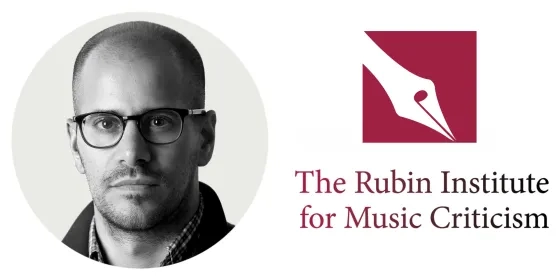NYT Classical Music Editor Zachary Woolfe on Music Journalism
Rubin Institute for Music Criticism faculty member and New York Times writer and editor Zachary Woolfe explains the role of music critics and the part they play in classical music.
By Mark Taylor
In an era of clickbait reporting and superfan culture, the role of journalism in music has arguably never been more notable. The topic of music criticism and reporting will take the main stage this summer when the San Francisco Conservatory of Music again hosts the Rubin Institute for Music Criticism. It will bring together leading music journalists, renowned musicians, and aspiring young writers for a week of intensive writing, workshops, and, of course, concerts. Live performances will include the San Francisco Symphony, San Francisco Opera, SFJAZZ, and one exciting new partner to be named at a later date.
The performances are reviewed by a hand-selected group of student fellows across the country and are critiqued in private meetings. The Institute culminates with the awarding of the $10,000 Rubin Prize in Music Criticism to the fellow who demonstrates exceptional promise in music criticism. The Rubin Institute has been called a premier training ground for emerging music journalists. Applications for emerging writers are open through January 31, 2022.
The SFCM Newsroom connected with New York Times Classical Music Editor and former New York Observer opera critic Zachary Woolfe on how he got involved and why any aspiring writer should apply to the program.
Tell us about your introduction to music.
I grew up surrounded by music my parents played —not classical or opera, but the Beatles, Joni Mitchell, Bob Dylan and Bruce Springsteen. But there was always a sense of music as being incredibly important and omnipresent. I started playing the cello in elementary school, stumbled onto opera when I was about 10, and fell in love.
What are you currently listening to?
Much of my listening is guided by my work —preparing for an upcoming performance, or working on a story by myself or another writer. As I answer these questions, I'm listening to Lou Harrison's boisterous yet delicate harpsichord sonatas, which are being played on one of the programs at Juilliard's Focus Festival, which is, well, focused this year on American music from the first half of the 20th century. And Liszt's B minor sonata, which Igor Levit is performing at Carnegie Hall.
What drew you to music journalism?
I had written a little bit for newspapers in college, but it wasn't the direction I thought my career would take. In 2008 I filled in for a friend who worked for the New York Observer, covering, of all things, the US Open tennis tournament. That led to a few other stories, and the following year, when the editor there asked if I might want to contribute a regular column, I asked if they might be interested in opera coverage, a combination of news, commentary and criticism. They were, and that was the start of my work in music journalism.
How did you get involved with the Rubin Institute for Music Criticism?
SFCM President David Stull was generous enough to ask me! And I believe in the institute's mission, that strong journalism and criticism is crucial to the future of music.
What role does journalism play in classical music and coverage?
As a journalist, I'm invested in music and its future, but can also provide an outsider's perspective, a sense of context and accountability. I don't need to be a booster; I can express my opinion freely (if fairly!).
Why is music journalism important?
I am here primarily to serve The Times' readers, to cut through hype and promotion and provide them with my opinion about what's good, what's bad, what matters, what doesn't. But I am also serving the music field and music itself —I'm Mozart or Verdi's advocate, and I'm trying to keep in mind the whole span of music history as I judge artists and performances.
Anything else you'd like to add?
I'm so looking forward to (finally) being in San Francisco and discussing performances. It's one of my favorite things, the thinking and talking that happens before, during and after a concert or opera.
Learn more about the Rubin Institute for Music Journalism.
